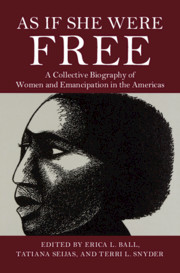Book contents
- As If She Were Free
- As If She Were Free
- Copyright page
- Dedication
- Contents
- Figures
- Contributors
- Elizabeth Catlett and the Form of Emancipation
- Acknowledgments
- Introduction
- Part I Claiming Emancipation during the Rise of New World Slavery
- 1 Margarita de Sossa, Sixteenth-Century Puebla de los Ángeles, New Spain (Mexico)
- 2 Paula de Eguiluz, Seventeenth-Century Puerto Rico, Cuba, and New Granada (Colombia)
- 3 Reytory Angola, Seventeenth-Century Manhattan (US)
- 4 Elizabeth Key, Seventeenth-Century Virginia (US)
- 5 Hannah Manena McKenney, Late Seventeenth- and Early Eighteenth-Century Bermuda and New Providence (Bahamas)
- 6 Juana de Godinez, Seventeenth-Century Lima (Peru)
- Part II Experiencing Freedom during Slavery’s Expansion
- Part III Envisaging Emancipation during Second Slavery
- Part IV Enacting Emancipation in the Aftermath of Slavery
- Bibliography
- Index
5 - Hannah Manena McKenney, Late Seventeenth- and Early Eighteenth-Century Bermuda and New Providence (Bahamas)
from Part I - Claiming Emancipation during the Rise of New World Slavery
Published online by Cambridge University Press: 24 September 2020
- As If She Were Free
- As If She Were Free
- Copyright page
- Dedication
- Contents
- Figures
- Contributors
- Elizabeth Catlett and the Form of Emancipation
- Acknowledgments
- Introduction
- Part I Claiming Emancipation during the Rise of New World Slavery
- 1 Margarita de Sossa, Sixteenth-Century Puebla de los Ángeles, New Spain (Mexico)
- 2 Paula de Eguiluz, Seventeenth-Century Puerto Rico, Cuba, and New Granada (Colombia)
- 3 Reytory Angola, Seventeenth-Century Manhattan (US)
- 4 Elizabeth Key, Seventeenth-Century Virginia (US)
- 5 Hannah Manena McKenney, Late Seventeenth- and Early Eighteenth-Century Bermuda and New Providence (Bahamas)
- 6 Juana de Godinez, Seventeenth-Century Lima (Peru)
- Part II Experiencing Freedom during Slavery’s Expansion
- Part III Envisaging Emancipation during Second Slavery
- Part IV Enacting Emancipation in the Aftermath of Slavery
- Bibliography
- Index
Summary
In 1660 Hannah Manena, the infant daughter of a woman named Priscilla, was baptized in the English colony of Bermuda. Her father, an English man, claimed ownership of her mother. Hannah later married a Bermudian man of color, Anthony McKenney, with whom she had two children before he was able to purchase her freedom when his own 22-year indenture ended in 1687. She had to leave Bermuda to maintain that hard-won freedom because an irregularly enforced 1676 law exiling all free people of color made staying too precarious. But leaving meant separation from kin including her mother and two aunts, as well as the two children who had inherited her enslaved status. Hannah and Anthony joined the fledging free community of color in New Providence in the Bahamas and were reunited with their children in 1694, after Anthony returned to Bermuda to retrieve them upon their grandfather’s death. Wills and census records from New Providence provide sketchy outlines of a free community of color who named their children after each other, left legacies to each other, baptized their children, and owned property, including human property.
- Type
- Chapter
- Information
- As If She Were FreeA Collective Biography of Women and Emancipation in the Americas, pp. 96 - 109Publisher: Cambridge University PressPrint publication year: 2020



